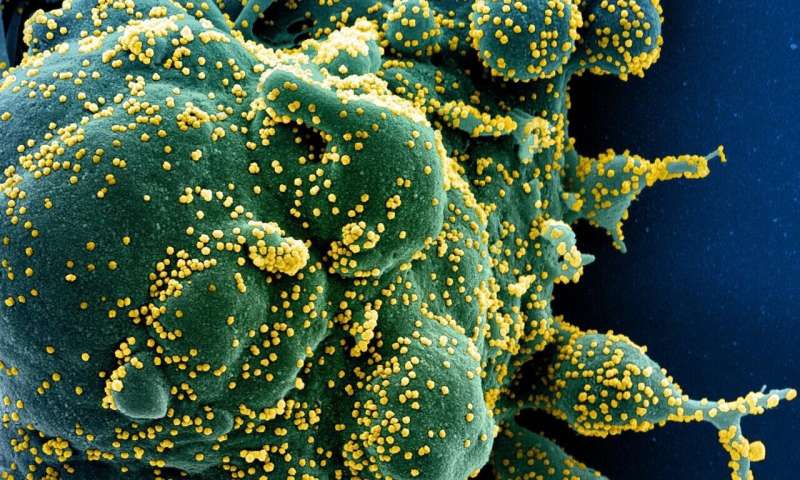
Researchers have identified a powerful combination of antivirals to treat COVID-19. Combining the drug brequniar with remdesivir or molnupiravir—both approved by the U.S. Food and Drug Administration for emergency use—inhibited the SARS-CoV-2 virus in human respiratory cells and in mice, according to a new study led by researchers in the Perelman School of Medicine at the University of Pennsylvania and the University of Maryland School of Medicine. The findings, published this week in Nature, suggest that these drugs are more potent when used in combination than individually.
Though they have not yet been tested in clinical trials, the combinations of drugs identified in their study have the potential to become very promising COVID-19 treatments, says principal investigator Sara Cherry, Ph.D., a professor of Pathology and Laboratory Medicine at Penn, who led the research with David Schultz, Ph.D., technical director of the Penn High-Throughput Screening Core, and Matthew Frieman, Ph.D., of the Center for Pathogen Research at the University of Maryland School of Medicine, along with collaborators from the National Institutes of Health.
“Identifying combinations of antivirals is really important, not only because doing so may increase the drugs’ potency against the coronavirus, but combining drugs also reduces the risk of resistance,” Cherry said.
SARS-CoV-2, the virus that causes COVID-19, has infected 382 million people and led to 5 million deaths worldwide. There remains an urgent need for therapeutics to treat COVID-19, which has been amplified by the emerging threats of new variants that may evade vaccines. In response to this demand, Cherry and a team of collaborators have screened 18,000 drugs in search of antiviral activity, using live SARS-CoV-2 infection in human respiratory epithelial cells, because lung cells are the major target for the virus.
The researchers identified 122 drugs that showed antiviral activity and selectivity against the coronavirus, including 16 nucleoside analogs—the largest category of antivirals that are used clinically. Among the 16 were remdesivir, which is given by injection into a vein and has been approved by the FDA to treat COVID-19, and molnupiravir, an oral pill that was authorized for use in December.
Also among the 122 drug candidates, the researchers identified a panel of host nucleoside biosynthesis inhibitors, including the experimental drug brequinar. Nucleoside biosynthesis inhibitors work by blocking the body’s own enzymes from making nucleosides, which prevents the virus from being able to “steal” RNA building blocks and replicate. Brequinar is currently being tested in clinical trials as a COVID-19 treatment and as part of a potential combination therapy for some cancers.
Cherry and collaborators hypothesized that combining brequinar with a nucleoside analog, such as remdesivir or molnupiravir, could work “synergistically” to create a more potent effect against the virus. Synergistic interactions occur when the total effect of two or more drugs is greater than the sum of the individual effects of each drug.
“We thought that using these nucleoside analogs while also reducing the levels of the host’s nucleoside building blocks might work together to super destroy the virus,” Cherry said. “It is really amazing that when you combine them, the virus is completely dead.”
The researchers tested the drugs in lung cells as well as in mice, and found that these combinations were highly effective against multiple strains of the coronavirus, including the Delta variant. The team is now in the process of testing the drugs against Omicron.
Additionally, the researchers found that Paxlovid—an oral antiviral that was also recently authorized by the FDA—could be combined with remdesivir or molnupiravir for an “additive” effect against SARS-CoV-2.
The next step would be for these drug combinations to be tested in clinical trials.
Source: Read Full Article